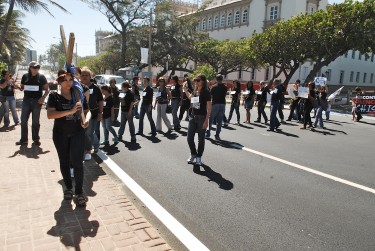In Puerto Rico, the public debate on domestic violence has reached a boiling point. A couple of blogs have been following up on Puerto Rico's Supreme Court's decision that victims of violence in adulterous relationships cannot be protected by Law 54 against Domestic Violence. And recently, the Court of Appeals of San Juan (the capital city) decided that another female victim of domestic violence could not receive the protection offered by Law 54 [es] because her relationship with the aggressor was allegedly only sexual.
The feminist coalition Movimiento Amplio de Mujeres de Puerto Rico [es] has been at the forefront in denouncing the recent attacks of a law (Law 54 of 1989 [es]) considered to be one of the most advanced pieces of legislation against domestic violence in Latin America. Recently, the Movimiento Amplio also published a post asking the head of the Office of the Women's Advocate and the Legislature [es] to support the inclusion of all women, notwithstanding their sexual orientation, under the provisions of Law 54. This was in response to a recently solved case where it was determined that a woman was murdered by her same sex partner.
A las personas y políticos que repiten los disparates de los fundamentalistas religiosos, les tenemos que aclarar que si dos personas del mismo sexo inician una relación sexo-afectiva, del tipo que sea, mantienen una relación de pareja tal y como la define la Ley 54… y si es así, tienen derecho a recibir la protección de esa ley cuando esa relación se torna en una violenta
In another post [es] the coalition condemns the decision once more and warns the people responsible that they will be judged harshly by history:
Aquellas personas que siguen pensando en destruir la Ley 54 a base de prejuicios moralistas o religiosos, serán juzgadas por la historia como lo que son: enemigos de la humanidad y de los derechos humanos de las mujeres.

The Movimiento Amplio convened, along with other organizations, a protest/performance during Holy Week in front of the Capitol to denounce the government's "religious fundamentalism." Photo courtesy MAMPR.
Law scholar and blogger Hiram Meléndez Juarbe published in the digital magazine 80 Grados [es] that the Supreme Court has been inconsistent in its decisions, contrasting their rulings on Law 7 (a law that authorized massive layoffs in government agencies), police escorts for ex-governors, and Law 54 [es]:
Entonces, la deferencia a las ramas políticas que figura prominentemente cuando se cuestiona la Ley 7, se desvanece cuando se cuestionan las escoltas (al punto de inventarse nuevos derechos económicos) y desaparece completamente cuando se enfrenta a la protección de víctimas en relaciones extramatrimoniales bajo el texto claro de la Ley 54.
Meléndez Juarbe feels that the new conservative makeup of the Supreme Court explains these decisions and feels that the following description of the current United States’ Supreme Court given by Ronald Dworkin applies to Puerto Rico's:
It would be a mistake to suppose that this right-wing phalanx is guided in its zeal by some very conservative judicial or political ideology of principle. It seems guided by no judicial or political principle at all, but only by partisan, cultural, and perhaps religious allegiance. It urges judicial restraint and deference to legislatures when these bodies pass measures that political conservatives favor… But the right wing coalition abandons restraint when it strikes down legislation that conservatives oppose…Ronald Dworkin, The Supreme Court Phalanx 47-48 (2008)
Meléndez Juarbe adds:
Y es que, con este Tribunal, como señala Dworkin, cuando sea relevante, cuando la ideología económica, religiosa y política esté en juego, emergerán transparentemente esas visiones. Simple y sencillamente. Así es que debemos leer al Nuevo Tribunal Supremo.
*Firuzeh Shokooh Valle contributed to this post.








3 comments
I can think of few laws that have been overused and abused more then Ley 54.